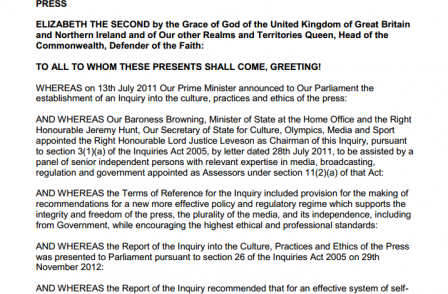
Newspaper and magazine publishers have agreed a subtle change to their press regulation plan which has been interpreted as ending the industry veto over appointments to the board of the regulator.
The rival Royal Charter for press regulation put forward by the newspaper industry in April (full document here) has been attacked for not creating a genuinely independent press regulator.
This has led to the Financial Times, Independent and Guardian refusing to give the document their backing.
The Government is currently mulling whether to go forward with its own press regulation Royal Charter (full document here) – agreed in a cross-party deal in March – or to back the industry proposal.
Yesterday representatives of all the major newspaper and magazine publishers met as the Industry Implementation Group.
And they put out a statement saying that they had agreed “to recommend to the industry that the requirement for qualified majority voting on appointments to the board of the new regulator for the press be dropped.
“The Implementation Group will recommend instead that the Appointments Panel should make its decisions by consensus of its members.”
The fact that the Independent and Guardian were at the meeting and that their names appear under the industry statement would suggest that they may now be falling into line behind the industry press regulation plan.
The change does not relate to the published Royal Charter – but to the articles of association, which are still being drawn up.
"Qualified majority voting" as defined in this context means that a majority of industry members of the Appointments Panel and a majority of indepenent, or lay, members would have to agree to all appointments to the board which will run the new regulator. It will now be up to the chair of the Appointments Panel to decide what constitutes a "consensus" when it comes to appointments.
Independent editor Chris Blackhurst has welcome the change. He said: “I think it's a very welcome step in the right direction. I was always worried that while the veto remained in place, the charter was not transparently independent.”
The apparent concession could now allow the Guardian, FT and Independent to give their backing to the press charter.
It is the second change to the press Royal Charter since it was published in April. Publishers have also agreed to the inclusion of a whistleblowers’ hotline as part of the the new regulator.
The press Royal Charter is open to consultation on the Privy Council website until 23 May. Details here about how to take part in the consultation.
It will then be up to the Government to advise the Privy Council on which Royal Charter to back at its next meeting at the end of June.
The Industry Implentation Group meeting was attended by representatives from: Association of Online Publishers, Newspaper Society (regional and local media), Professional Publishers Association, Scottish Newspaper Society, Associated Newspapers, Bauer Media, Guardian Media Group, Haymarket Media Group, Hearst Magazines UK, Immediate Media; London Evening Standard, i, Independent & Independent on Sunday; News International, Newsquest Media Group, Northern & Shell, Telegraph Media Group and Trinity Mirror.
Email pged@pressgazette.co.uk to point out mistakes, provide story tips or send in a letter for publication on our "Letters Page" blog

